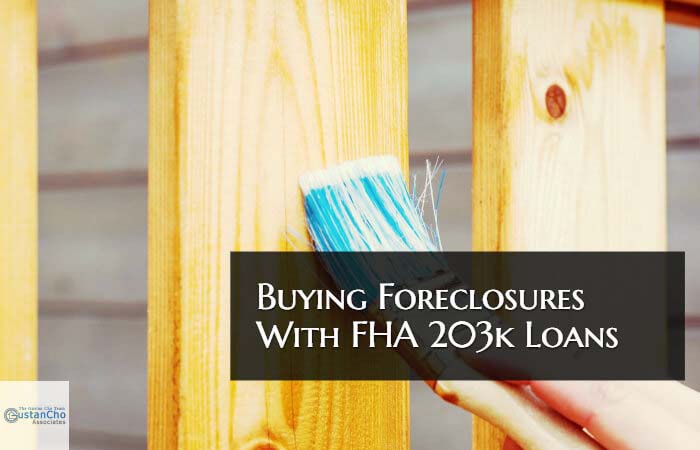Buying Foreclosures And Fixer Uppers With FHA 203k Loans
This BLOG On Buying Foreclosures And Fixer Uppers With FHA 203k Loans Was UPDATED On May 1st, 2019
Many home buyers believe that buying foreclosures are a bargain. Some buyers just look at properties that foreclosed. This may be the case but not always so. Home Buyers of fixer uppers and foreclosure can now make their dream of buying a home that needs renovations and customized it to their liking with FHA 203k Rehab Loans offered by Gustan Cho Associates Mortgage Group. Buyers of owner occupant homes can purchase a fixer upper with an acquisition and construction loan with a one time close with 3.5% down payment of the after repaired value of the property. One to four unit owner occupant properties.
There are two different types of FHA 203k Loan Programs:
- FHA Streamline 203k Loans which limits maximum construction budget up to $35,000
- Full Standard FHA 203k Loans where there is no maximum construction budget and the maximum loan limit is up to FHA Loan Limit of the county the property is located
We have no mortgage overlays on FHA Loans and whatever the FHA Guidelines are, it applies to FHA 203k Loans.
Myths Of Buying Foreclosures And Fixer Uppers
- Home buyers can either purchased foreclosed properties that are bank owned, also called REOs
- Or they can bid on properties at an auction when there is a public auction via sheriff’s sale
- Their hope is when they go to an auction that they will get the winning bid and get a bargain of a deal
- Again, this may be the case for some folks but nothing is ever too good to be true
- There are always negatives when there are positive factors
- For example, if the property is being offered through a sheriff’s public auction, many of these properties are not available for a home inspection prior to the auction
- They are offered on an as-is condition basis
- Many folks who bid on homes at auctions just do a drive by inspection and have no idea on the condition of the inside of the subject property
- Many people who had their homes foreclosed on are extremely bitter towards losing their homes
- Many will strip the homes or trash the homes where many times, a gut rehab is required
- Other times, homes that are foreclosed on are in great shape and not too much repair is needed
- It is a major risk factor that a home buyer buying a foreclosed home needs to take
- If the foreclosed hope has stripped plumbing, cabinets, millwork, and other high ticket items, it can cost tens of thousands of dollars in renovating the home to liveable standards
Most foreclosures are fixer uppers and cannot be financed. HUD, the parent of FHA, now has FHA 203k Rehab Loans where home buyers can purchase fixer uppers with a loan program that offers acquisition and construction financing all in one closing.
Buying Foreclosures With People Living In The Home
Buyers thinking of buying foreclosures will be purchasing the property on an as-is condition. This means if there are people living in the home, whether is the homeowner that is being foreclosed on, squatters, or tenants, it is the foreclosed home buyer’s responsibility to evict the occupants of the foreclosed home.
- There are strict eviction laws throughout the country
- Each county has its own rules and regulations on how to evict occupants of a home
- It can cost anywhere between hundreds to thousands of dollars to evict an occupant of a home
- It is not as simple as threatening them or shutting off the utilities or changing the locks or throwing their belongings out in the street
- Normally, owners would hire an eviction attorney to handle this process where they may need to take the illegal occupants of the property to court
- If the judge rules in petitioners favor, they need to pay the sheriff to handle the actual eviction
- All this takes time and money
- The existing illegal home occupants can be doing major damage in the meantime while awaiting eviction
- The best recommendation I can give a homeowner trying to evict an occupant of a home is to be nice to them and offered them cash to move out
- This may seem not right but it is the most sensible thing to do and save costs and time and the chance of the occupant trashing the place due to bitter feelings and anger
Benefits Of Buying Foreclosures

Many home buyers assume that just because a home is a foreclosed property that they will get a deal and the property is under market value. This is so not true.
- I strongly suggest home buyers who are looking at foreclosed homes or fixer-uppers to also look at regular homes that are listed in the market place
- Many foreclosures are either listed at market price or above market price initially
- When the property sits in the market for many months, that is when lenders who own the foreclosed home will drop the market price
- They will continually do so until the home sells
- There are professional foreclosed home shoppers that all they do is nothing but scavenging foreclosed homes
- If a foreclosed home is under priced, buyers will see that there will be multiple purchase offers
- Many under priced homes get cash offers
- Limiting home shopping just to foreclosures and fixer uppers is fine as long as buyers do due diligence on the area and know the comparable sale to the subject properties.
Buying Foreclosures With FHA 203k Loans
Many home buyers will need a mortgage when buying a foreclosure that is bank owned.
- Banks will normally not repair any items on their REO inventory
- They will just sell the property as-is
- However, home buyers who depend on mortgages to purchase a bank owned foreclosure or REO will need an appraisal done
- In order to get a final mortgage loan approval, the property needs to pass an appraisal
- If the appraisal notes that there are maintenance issues, the home may not pass appraisal and the items may need to be corrected before the appraiser is willing to sign off on it
- For example, on a recent conventional appraisal, the appraisal noted that the subject property did not have any finished flooring
- The foreclosed homeowner had stripped the flooring, which was carpeting, and the floor was nothing but plywood
- This home did not pass appraisal standards
- In order to proceed with the closing of the foreclosed property, someone needed to have the floors finished and an appraisal re-inspection needed to be done
- If the seller ( the bank ) refuses to do the work, the home buyer can do the work and get some cheap carpeting and finish the floor
- However, the home buyer needs to cough up the money and will need the sellers’ permission to get access to the property
- Depending on which the lender owns the property, the seller may or may not grant access to do the work due to liability reasons
Buying Foreclosures Versus Short Sales
A short sale is when a homeowner gets permission from their mortgage lender to sell their home below what they owe on their property. Most short sale homeowners are responsible folks who can no longer afford their home and need to sell their property to avoid foreclosure and a deficit judgment from a foreclosure. Short sales are safer to purchase than foreclosed homes because most short sale homes are not stripped like some foreclosed homes are and it is to the current homeowners best interest in selling their home in order to avoid foreclosure. Both short sales and foreclosed homes normally take longer to close than traditional home closings due to the red tape in dealing with the banks that own the property.







